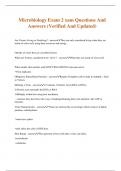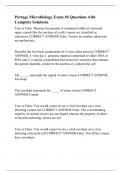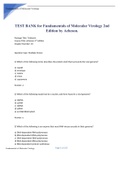A viral envelope - Study guides, Class notes & Summaries
Looking for the best study guides, study notes and summaries about A viral envelope? On this page you'll find 726 study documents about A viral envelope.
Page 3 out of 726 results
Sort by

-
Portage Learning BIOD 171 Module 6 Study guide with Complete Solutions rated A+
- Exam (elaborations) • 12 pages • 2024
-
Available in package deal
-
- $9.99
- + learn more
Portage Learning BIOD 171 Module 6 Study guide with Complete Solutions rated A+ True or False: viruses can be classified as prokaryotic or eukaryotic - False. Viruses are neither prokaryotic or eukaryotic What is an obligate intracellular parasite? - viruses cannot replicate unless inside a living host cell. As a parasite, a virus depends on its living host to provide the framework (proteins, etc) to replicate—to make additional copies of itself. What is a viral capsid? - a membrane-like pr...

-
Microbiology Exam 2 xam Questions And Answers (Verified And Updated)
- Exam (elaborations) • 30 pages • 2024
- Available in package deal
-
- $14.49
- + learn more
Microbiology Exam 2 xam Questions And Answers (Verified And Updated) Are Viruses Living or Nonliving? - answerThey are only considered living when they are inside of a host cell, using their resources and energy. Outside of a host they are considered intert. When are Viruses considered to be "alive"? - answerWhen they are inside of a host cell. When inside, their nucleic acid (ONLY RNA OR DNA) become active. *Virus replicates Obligatory Intracellular Parasites - answerRequire livinghos...

-
BIO 390 Exam 2 Questions With 100% Correct Answers
- Exam (elaborations) • 31 pages • 2024
-
- $13.49
- + learn more
BIO 390 Exam 2 Questions With 100% Correct Answers Virus - answerLatin for poison (Pasteur) Not living Not cellular Obligate intracellular parasite - answerPerform no metabolism Can not freely reproduce No protein synthesis Carry no or few enzymes Naked virus (non-enveloped virus) anatomy: - answerGenetic material (DNA or RNA) Capsid-protein coating (composed of capsomere proteins) Enveloped virus anatomy: - answerGenetic material (DNA or RNA) Capsid Envelope - phospholipid bilayer ...

-
BIO 390 Exam 2 Questions With 100% Correct Answers
- Exam (elaborations) • 31 pages • 2024
-
- $14.49
- + learn more
BIO 390 Exam 2 Questions With 100% Correct Answers Virus - answerLatin for poison (Pasteur) Not living Not cellular Obligate intracellular parasite - answerPerform no metabolism Can not freely reproduce No protein synthesis Carry no or few enzymes Naked virus (non-enveloped virus) anatomy: - answerGenetic material (DNA or RNA) Capsid-protein coating (composed of capsomere proteins) Enveloped virus anatomy: - answerGenetic material (DNA or RNA) Capsid Envelope - phospholipid bilayer ...

-
Portage Learning BIOD 171 Module 6 Questions with 100% Correct Answers | Verified | Latest Update
- Exam (elaborations) • 12 pages • 2024
- Available in package deal
-
- $11.98
- + learn more
Portage Learning BIOD 171 Module 6 Questions with 100% Correct Answers | Verified | Latest Update True or False: viruses can be classified as prokaryotic or eukaryotic False. Viruses are neither prokaryotic or eukaryotic What is an obligate intracellular parasite? viruses cannot replicate unless inside a living host cell. As a parasite, a virus depends on its living host to provide the framework (proteins, etc) to replicate—to make additional copies of itself. What is a viral capsid? a ...

-
BISC 261 test 2 || A+ Graded Already.
- Exam (elaborations) • 18 pages • 2024
-
Available in package deal
-
- $13.09
- + learn more
Viruses have typical cellular structure like other living organisms. correct answers FALSE Viruses in the extracellular state possess few, if any, active enzymes. correct answers TRUE Which is not true of viruses? correct answers They infect animal and plant cells only. Which of the following is true of viruses in the extracellular phase? correct answers They behave as a macromolecular complex and are no more alive than are ribosomes. A complete virus particle is called a correct ans...

-
Portage Microbiology Exam #6 Questions with Complete Solutions
- Exam (elaborations) • 9 pages • 2024
-
- $14.99
- + learn more
True or False: Because the genome is contained within an enclosed space, (much like the nucleus of a cell) viruses are classified as eukaryotic CORRECT ANSWER False. Viruses are neither eukaryotic nor prokaryotic Describe the two basic components of a virus (short answer) CORRECT ANSWER A virus has 1. genomic material comprised of either DNA or RNA and 2. a capsid, a membrane-like protective structure that contains the genetic material, similar to the nucleus of a eukaryotic cell The _____...

-
TEST BANK for Fundamentals of Molecular Virology 2nd Edition by Acheson.
- Exam (elaborations) • 272 pages • 2022
-
- $15.49
- 1x sold
- + learn more
1 TEST BANK for Fundamentals of Molecular Virology 2nd Edition by Acheson. Package Title: Testbank Course Title: Acheson 2nd edition Chapter Number: 01 Question type: Multiple Choice 1) Which of the following terms describes the protein shell that surrounds the viral genome? a) capsid b) envelope c) matrix d) virion e) capsomere Answer: a 2) Which of the following would not be a nucleic acid form found in a viral genome? a) dsDNA b) ssDNA c) dsRNA d) ssRNA e) an...

-
Microbiology Exam 2 uiowa Knudtson Questions & 100% Correct Answers
- Exam (elaborations) • 65 pages • 2024
- Available in package deal
-
- $13.49
- + learn more
What kind of cells can viruses infect? ~~> viruses infect every type of cell, including bacteria, algae, fungi, protozoa, plant, and animals Are viruses alive? ~~> two sides of the debate: 1. since viruses are unable to replicate independently from the host cell, so no, not alive 2. even though viruses do not exhibit most of the life processes of cells, they can direct them, so more than inert (lacking strength/ability to move) and lifeless molecules viruses are better desc...

-
microbiology final straighterline questions & answers verified 2023
- Exam (elaborations) • 10 pages • 2023
-
Available in package deal
-
- $11.49
- 1x sold
- + learn more
microbiology final straighterline questions & answers verified 2023phylogeny The study of evolutionary relationships among organisms is called ______. Last Universal Common Ancestor The three cell types discussed, eukaryotes, archaea, and bacteria, all derived from ______. always harmful to their host Organisms called parasites are ______. Thermal hot springs warmed by heat from earth's interior Which of the following does not indicate microbe involvement in energy and ...

Did you know that on average a seller on Stuvia earns $82 per month selling study resources? Hmm, hint, hint. Discover all about earning on Stuvia


